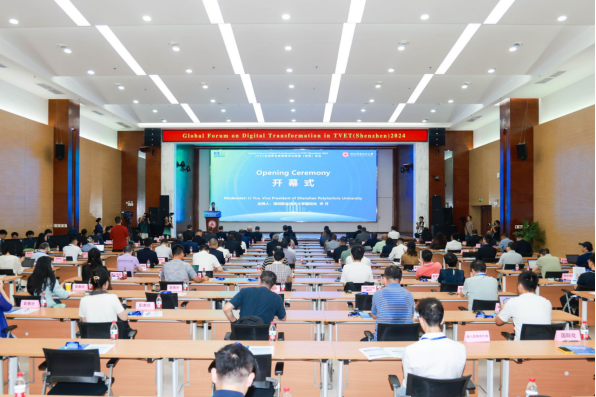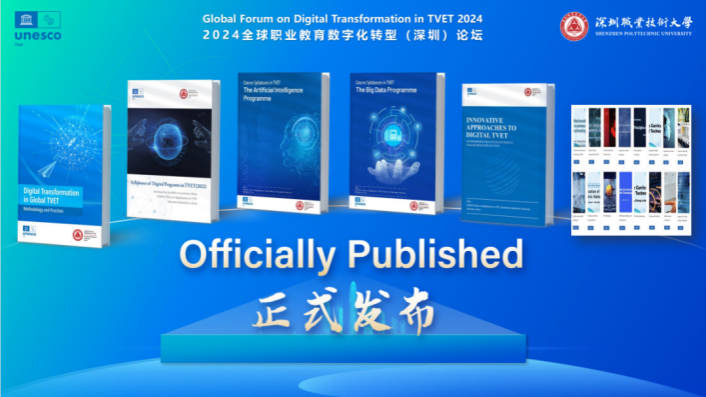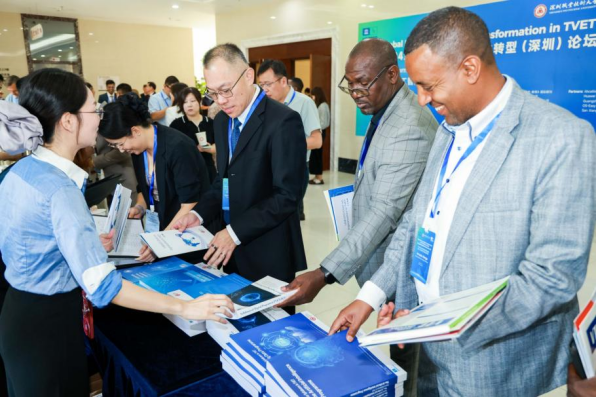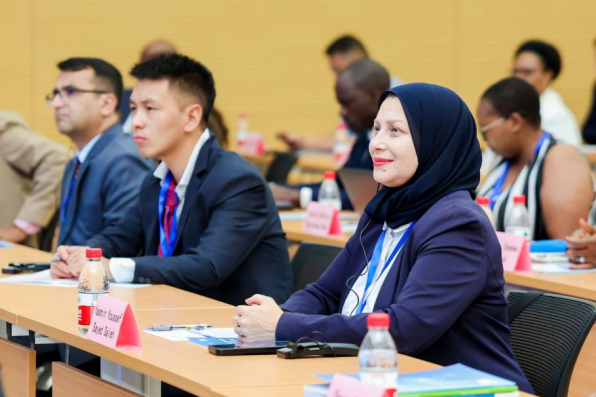
The Global Forum on Digital Transformation in TVET 2024 was held at our school.
The Global Forum on Digital Transformation in TVET 2024 was held at our school on October 22-23, showcasing five significant achievements of the UNESCO Chair on Digitalization in Technical and Vocational Education and Training (TVET) (the “Chair”) since its establishment in 2022. These achievements include a global research report on digital transformation in TVET, 28 standards for specialized programs, 50 digital technology course standards, 100 exemplary cases, and 16 online courses focused on digital skills. Chairperson and University Party Secretary Yang Xinbin highlighted the Chair’s ongoing commitment to advancing research that supports digital transformation in global TVET, contributing to youth employment and digital skills development.

Launch of the Chair’s Five Major Achievements.
The forum, co-hosted by UNESCO-UNEVOC, UNESCO’s East Asia Multisectoral Regional Office, and our school, brought together around 130 representatives from government bodies, educational institutions, industry enterprises, and international organizations across 35 countries. Themed “Transforming TVET for the AI Era”, participants explored strategies for digital governance in TVET and the integration of AI technologies. Discussions focused on best practices in building digital skills, reforming curricula, and enhancing school-enterprise partnerships to create a resilient, dynamic global TVET system.
During the opening ceremony, Zhong Jiajun, Deputy Director of the Foreign Affairs Office of Shenzhen Municipal People’s Government, emphasized the importance Shenzhen places on international collaboration platforms, noting how this forum enables the global TVET community to address challenges posed by the AI era. Cai Maozhou, Chief Inspector of Education Bureau of Shenzhen Municipality, added that as a hub of technological innovation, Shenzhen would continue supporting the integration of vocational education and the digital economy to foster the city’s innovation and digital talent development. Shahbaz Khan, Director of UNESCO’s East Asia Multisectoral Regional Office, commended the university’s contributions and leadership in advancing digital transformation within TVET, noting UNESCO’s ongoing support for international cooperation to meet global TVET challenges. Huawei’s Vice President of Public Sector, Li Shengyang, expressed Huawei’s eagerness to deepen collaborations in digital education by leveraging the company’s advanced solutions to support the digital evolution of vocational education. Xu Jianling, Deputy Party Secretary and President of SZPU, highlighted the university’s achievements in international cooperation in his speech, stating that SZPU would continue to strongly support the work of the UNESCO Chair on Digitalization in TVET. He emphasized the university’s commitment to collaborating deeply with UNESCO and countries worldwide in advancing digital transformation in TVET, aiming to contribute to the global development of digitalized vocational education.
In the keynote presentations, Yang Xinbin shared insights on “Digital Transformation in TVET from the Perspective of New Productive Forces”, outlining the background of TVET transformation in the era of digital intelligence, the role of new productive forces in driving this shift, and SZPU’s approaches to digital transformation, which offer globally relevant models and insights. Professor Zhu Zhiting of East China Normal University discussed the core principles, logic, and opportunities within digital transformation in education, providing methodologies and strategies for global TVET systems to address these challenges effectively.


130 representatives from government bodies, educational institutions, industry enterprises, and international organizations across 35 countries attended the forum.
The forum included three thematic sessions on digital governance, institutional capacity-building, and school-enterprise integration, providing comprehensive support and practical pathways for the transformation of TVET in the digital era. Forum participants also visited Huawei and SZPU to expand their international perspectives. The forum’s content and outcomes will be published on the Chair’s official website and UNESCO-UNEVOC’s network, reaching over 140 countries and further enhancing the Chair’s global influence.
The Global Forum on Digital Transformation in TVET serves as the Chair’s annual flagship event, now successfully held twice since its inception in 2022, drawing widespread international attention. Moving forward, the Chair will continue organizing activities to foster cross-regional, national, and institutional partnerships, promoting China’s advanced digitalization practices and theories in TVET globally.
(Text/Zeng Xiuzhen, Africa-Asia Center; Photos/Zhang Lei, Publicity Department, Yao Jiewen, Integrated Media Center)
 School Motto:
School Motto:
 Search
Search
 School Motto:
School Motto:
 Search
Search